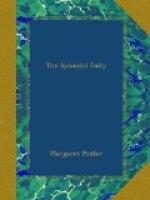“And why not?” he would say, when charged with pampering them by some starchy member of his congregation who considered that parochial visitation should be embellished solely by the delivery of appropriate tracts. “And why not pamper them a bit, poor souls? A pipe of baccy goes a long way towards taking your thoughts off a bad leg—as I found out for myself when I was laid up with an attack of the gout my maternal grandfather bequeathed me.”
Whilst the Rector paid his visits, Diana waited outside the various cottages, driving the pony-trap slowly up and down the road, and stopping every now and again to exchange a few words with one or another of the village folk as they passed.
She was frankly delighted to be home again, and was experiencing that peculiar charm of the Devonshire village which lies in the fact that you may go away from it for several years and return to find it almost unchanged. In the wilds of Devon affairs move leisurely, and such changes as do occur creep in so gradually as to be almost imperceptible. No brand-new houses start into existence with lightning-like rapidity, for the all-sufficient reason that in such sparsely populated districts the enterprising builder would stand an excellent chance of having his attractive villa residences left empty on his hands. No; new houses are built to order, if at all. In the same way, it is rare to find a fresh shop spring into being in a small village, and should it happen, in all probability a year or two will see the shutters up and the disgruntled proprietor departing in search of pastures new. For the villagers who have always dealt with the local butcher, baker, and grocer, and whose fathers have probably dealt with their fathers before them, are not easily to be cajoled into transferring their custom—and certainly not to the establishment of any one who has had the misfortune to be born outside the confines of the county, and is therefore to be briefly summed up in the one damning word “vurriner.” [1]
So that Diana, returning to Crailing for a brief holiday after a year’s absence, found the tiny fishing village quite unchanged, and this fact imparted an air almost of unreality to the twelve busy, eventful months which had intervened. She felt as if she had never been away, as though the Diana Quentin who had been living in London and studying singing under the greatest master of the day were some one quite apart from the girl who had passed so many quiet, happy years at Crailing Rectory.
The new and unaccustomed student’s life, the two golden visits which she had paid to Italy, the introduction into a milieu of clever, gifted people all struggling to make the most of their talents, had been such an immense change from the placid, humdrum existence which had preceded it, that it still held for her an almost dreamlike charm of novelty, and this was intensified at the present moment by her return to Crailing to find everything going on just in the same old way, precisely as though there had been no break at all.




